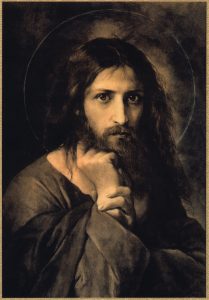The Holy Spirit, the Third Person of the Holy Trinity, is not an abstract principle or a vague influence. He is God, co-eternal and consubstantial with the Father and the Son—“the Lord, the Giver of Life,” as we confess in the Niceno-Constantinopolitan Creed, which was formulated and defended by the Fathers of the First and Second Ecumenical Councils against the heresies of their day.
From the beginning, the Holy Spirit has been active. In the first words of Genesis, “the spirit of God swept over the face of the waters.” (Genesis 1:2) This is not poetic imagery. It is the Spirit Himself, hovering, preparing, ordering, bringing forth creation. He is not limited to a moment in history. His work is continuous. He gives breath to man, wisdom to the prophets, strength to the martyrs, grace to the saints, and unity to the Church. As we read in the Psalms, “When thou sendest forth thy Spirit, they are created; and thou renewest the face of the ground.” (Psalm 104:30, RSV-CE)
The Holy Spirit acts definitively in the sacraments, which are not symbolic gestures but the very instruments by which God communicates His life to man. In Baptism, the Spirit regenerates the soul. In Chrismation, He seals the newly illumined with the anointing of grace. Saint Paul wrote, “For in the one Spirit we were all baptized into one body… and we were all made to drink of one Spirit.” (1 Corinthians 12:13) The Apostolic Church does not baptise into an ideology or a philosophy, but into the Body of Christ, and it is the Holy Spirit who makes this possible.
The Divine Liturgy itself is unthinkable without the Holy Spirit. In the Anaphora, the celebrant calls down the Spirit in the epiclesis, not as a poetic expression but as a sacred reality—so that the bread and wine become the true Body and Blood of Christ. Without the Spirit, there is no Church. The Church is not an institution or a society; it is the Body of Christ enlivened by the Holy Spirit. The Spirit binds the faithful together in one mind, one heart, and one confession.
In the lives of the faithful, the Spirit is the Comforter and the Teacher. He does not speak on His own, but teaches what He hears from the Son (cf. John 16:13). He is not a silent observer, but the very One who enables prayer, gives repentance, strengthens in temptation, illumines the mind, and purifies the conscience. “Likewise the Spirit helps us in our weakness… that very Spirit intercedes with sighs too deep for words” (Romans 8:26). The fruits of the Spirit—“love, joy, peace, patience, kindness, generosity, faithfulness, gentleness, and self-control” (Galatians 5:22–23)—are not moral improvements. They are evidence of the Spirit’s work in the soul. Without Him, these things are impossible. The saints are not moral heroes. They are vessels of the Holy Spirit, cleansed through ascetic struggle, humility, and grace.
The Orthodox Christian cannot live without the Holy Spirit. He is present in the Jesus Prayer whispered in the dark. He is present in the tears of repentance. He is present in the quiet strength of those who endure suffering with faith. As Saint Symeon the New Theologian taught, the experience of the Holy Spirit is the very sign of true Christianity. If a man claims to be a Christian but knows nothing of the Holy Spirit, he has not yet begun.
It must be said plainly—the Spirit is not known through emotionalism, nor is He given to those outside the Body of Christ in its fulness. The grace of Pentecost abides in the one Holy Church. She alone has preserved the fulness of Apostolic tradition, both in doctrine and in sacrament. The Holy Spirit does not contradict Himself. He does not lead the faithful into schism, innovation, or doctrinal decay. He speaks what is from the Father, and this is handed down unchanged through the Fathers, the councils, and the liturgical life of the Church.
He is “everywhere present and filling all things,” as we say in the prayer to the Holy Spirit. But He fills only those who are emptied of pride and sin, who submit themselves to the life of the Church, who confess the ancient faith without compromise. It is through the Spirit that we are sanctified, strengthened, and preserved unto eternal life. Without Him, the Christian falls into delusion or despair. With Him, the faithful are made steadfast, not by human effort, but by the grace of God working within.
This is not a matter of speculation or poetic imagery. It is the unchanging teaching of the Orthodox Church, confirmed by the Bible, upheld by the Fathers, and lived by the saints. Let no one speak lightly of the Holy Spirit. He is God. He is present. And He is not mocked.
May God bless you +
Fr. Charles
13 April 2025

Comments are closed.